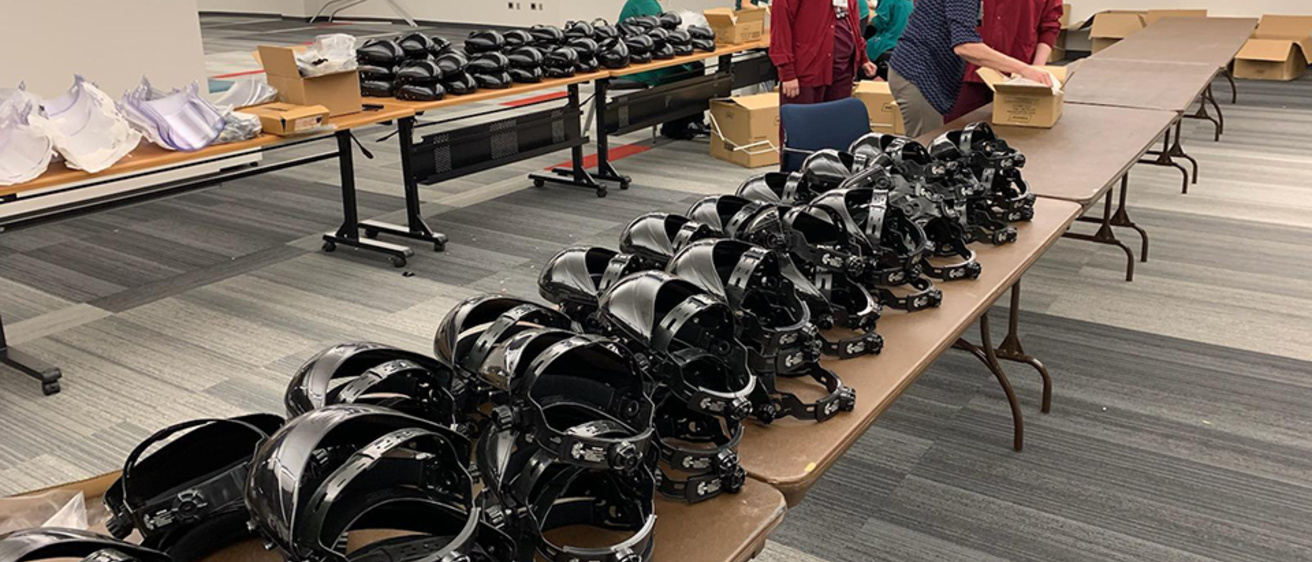In the wee hours of the morning—on a Saturday, no less—a request for help came in: University of Iowa Hospitals & Clinics needed 20,000+ face shields to help protect its health care staff from being infected with COVID-19.
“I placed a call to team members, and within minutes we had staff online searching the internet for face shields,” says Debby Zumbach, UI associate vice president and director of business services and purchasing. “Less than two hours later, we had secured the volume, with various arrival dates.”
Coronavirus updates
Stay current with campus COVID-19 information.
It takes a village
The staff in University Shared Services generally processes financial transactions from across campus, working with purchase orders, travel, and procurement cards, while Strategic Sourcing works with vendors to procure items and fill orders.
During this COVID-19 pandemic, staff members on both teams are putting in more than 60 hours a week to help University of Iowa Hospitals & Clinics secure supplies that are essential in containing the spread of the virus: face masks, face shields, disinfectants, isolation gowns, et cetera. They have been ready to process orders remotely since late February and are prepared to continue as long as needed.
UI Health Care needs you
University of Iowa Health Care leaders have issued an urgent request for Iowa businesses and individuals to donate new or used protective face shields to the hospital. The shields are used by hospital staff to keep employees safe and help prevent the spread of COVID-19.
Learn more about how you can donate.
An hour later, she adds, another request from the hospital came through, and the group got to work again, sourcing the items from both existing and new vendors. For weeks, more than 100 team members in University Shared Services and Purchasing have been putting in extra hours, frequently on nights and weekends, to help the hospital secure items badly needed during the COVID-19 pandemic.
Although the teams lead purchasing for the entire campus, including UI Hospitals & Clinics and the Carver College of Medicine, orders of this scale have become the new normal since Feb. 29, when leadership took note of the growing global crisis and started ordering extra emergency supplies.
“We ordered extra masks, disinfectants, paper towels, and bleach. We mirrored quantities from the 2008 flood,” says Renee Funk, director of strategic sourcing. “Suppliers were already getting low on these items, so we worked with our campus colleagues in Surplus, Shared Services, and Purchasing to fill the university’s needs.”
In the predawn hours, team members are powering up their laptops from home to get a jump on supplies and be one of the first to secure them, says Dani Weber, director of University Shared Services and interim director of Accounts Payable.
“A vendor might indicate in the morning that it has the supply we need, but then it’s gone within hours. We have to act quickly,” Weber says. “We’re committed to procuring supplies to help make the staff and patients safe.”
Doing so requires a team effort, Funk explains, and staff in Accounts Payable, Purchasing, and Travel work together. A vendor team reviews, verifies, and enables vendors for ordering within hours, while the procurement card team works with the university’s bank partners to ensure appropriate levels of credit are available to complete the purchase. Timeliness is critical—without a prompt response, the needed products can be lost.
Also essential during this time is Purchasing’s collaboration with Procurement & Value Implementation Services, the supply chain department at UI Hospitals & Clinic. The staff there is available at all hours to validate product selection and quantities to ensure the supplies ordered will best take care of patients.
On a typical day without a global pandemic, Funk says she receives about 100 to 125 email requests from across campus; now, she is getting up to 600 daily, including on weekends, and order quantities can top 1 million. Her staff has risen to the occasion.
“The work they are doing is in addition to their regular work, which is a full-time job. Some haven’t had a full day off in three weeks,” she says. “The communication and collaboration of the staff is very inspiring. I stand in awe—not only of our team members but also our customers and vendors.”
And, Funk adds, there is no end in sight.
“We’re in it for the long haul, but there’s been no complaining. Despite personal anxieties about the pandemic, the team has stayed strong, and they continue to be willing to put out the effort needed.”
